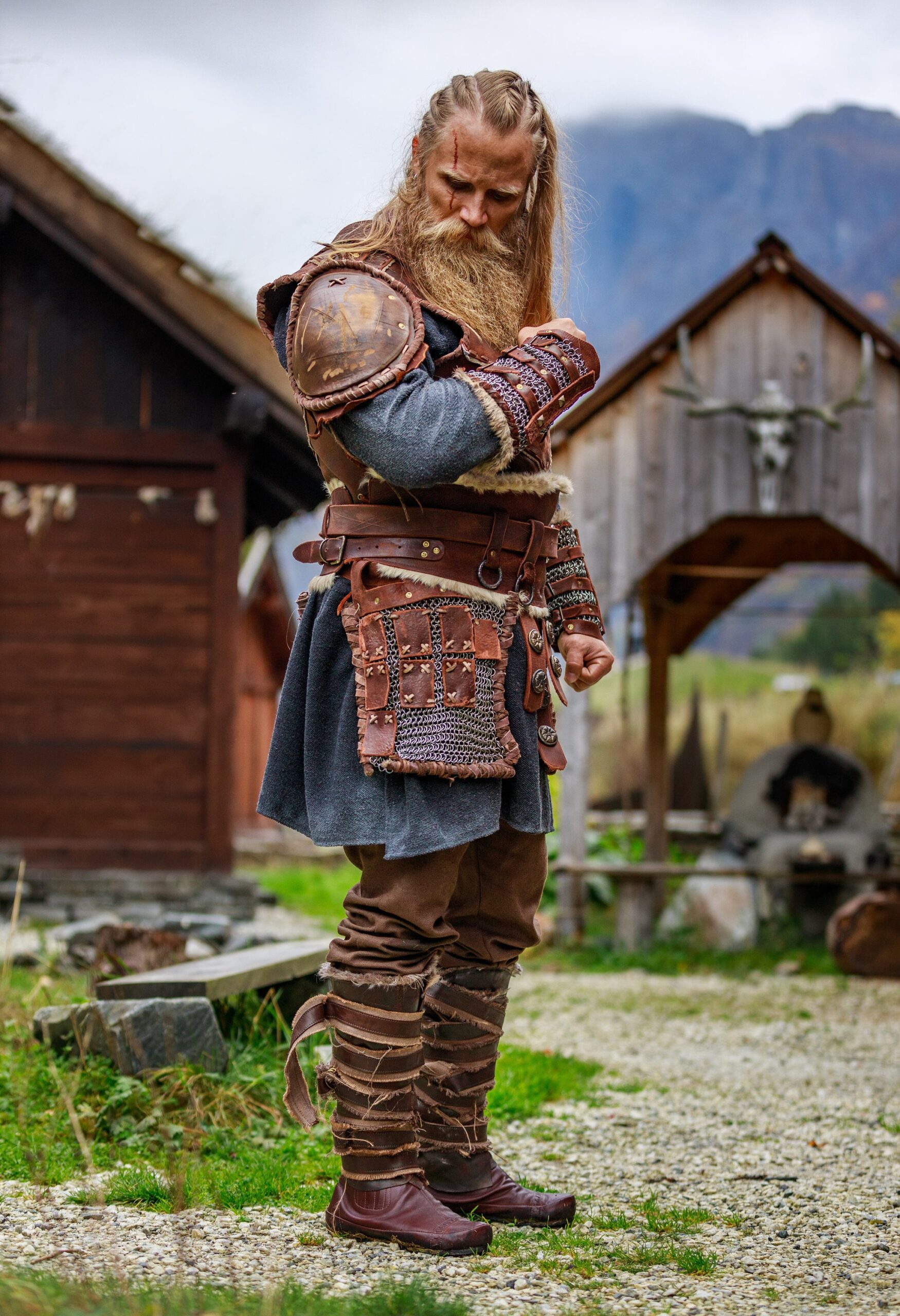Introduction:
Vikings, the infamous seafaring Norse explorers and warriors of the Viking Age (approximately AD 793–1066), have captured the imagination of scholars, historians, and enthusiasts alike. One aspect that reflects their rich cultural heritage is their distinctive attire. This case study explores the evolution of Viking outfits, shedding light on their cultural significance in both historical and contemporary contexts.
 Historical Context:
Historical Context:
The Viking Age was characterized by voyages of exploration, trade, conquest, and colonization. Vikings hailed from Scandinavia and adopted different styles of clothing influenced by their regional and social backgrounds. Norse sagas, archaeological excavations, and iconographic representations help unveil the historical context of Viking outfits.
The Basic Elements of Viking Outfits:
Examining the basic components of Viking attire is crucial to understanding their culture. The primary components include tunics, trousers, hosen, shoes, accessories like belts, brooches, and jewelry, as well as headgear such as helmets and caps. Vikings adorned their clothing with intricate embroidery, patterns, and symbols that held deep cultural and symbolic meanings.
Cultural Significance of Viking Outfits:
The Influence of Viking Outfits on Cultural Imagery and Popular Culture:
Contemporary Interpretations of Viking Outfits:
Conclusion:
The evolution of Viking outfits from the Viking Age to the present day reveals their cultural significance and enduring influence. Through historical context, cultural symbolism, and contemporary interpretations, we gain insight into their clothing's functionality, social implications, and religious importance. The study of Viking attire not only helps us understand the past but also highlights the relevance and enduring fascination with this ancient civilization.
Vikings, the infamous seafaring Norse explorers and warriors of the Viking Age (approximately AD 793–1066), have captured the imagination of scholars, historians, and enthusiasts alike. One aspect that reflects their rich cultural heritage is their distinctive attire. This case study explores the evolution of Viking outfits, shedding light on their cultural significance in both historical and contemporary contexts.
 Historical Context:
Historical Context:The Viking Age was characterized by voyages of exploration, trade, conquest, and colonization. Vikings hailed from Scandinavia and adopted different styles of clothing influenced by their regional and social backgrounds. Norse sagas, archaeological excavations, and iconographic representations help unveil the historical context of Viking outfits.
The Basic Elements of Viking Outfits:
Examining the basic components of Viking attire is crucial to understanding their culture. The primary components include tunics, trousers, hosen, shoes, accessories like belts, brooches, and jewelry, as well as headgear such as helmets and caps. Vikings adorned their clothing with intricate embroidery, patterns, and symbols that held deep cultural and symbolic meanings.
Cultural Significance of Viking Outfits:
- Functionality and Practicality: Viking outfits were designed to cater to the needs of their lifestyle. Their clothing had to be durable, protect them during their expeditions, and provide flexibility for combat and everyday activities.
- Social Hierarchy and Status: Variations in Viking outfits allowed for the identification of social ranking within their society. The quality of fabric, embellishments, and accessories differentiated between the upper, middle, and lower classes, revealing aspects of their social hierarchy.
- Symbolism and Religious Beliefs: Viking outfits displayed symbols and motifs from Norse mythology, reflecting the importance of religious beliefs in their culture. For instance, the use of Thor's hammer (Mjölnir) symbolized strength, while Valknut represented the connection between life, death, and the afterlife.
The Influence of Viking Outfits on Cultural Imagery and Popular Culture:
- Renaissance and Romantic Revival: Throughout history, artistic representations of Vikings in paintings, sculptures, and literature often incorporated their distinct outfits. The Renaissance and Romantic periods, especially, produced numerous works that perpetuated the image of Viking attire, resulting in its romanticization.
- Modern Influence: Viking outfits continue to influence popular culture, particularly in the entertainment industry. Movies, television series (such as the critically acclaimed Vikings series), and video games utilize Viking clothing to create an authentic atmosphere and captivate audiences.
Contemporary Interpretations of Viking Outfits:
- Historical Reenactments: The resurgence of historical reenactments and living history events has seen an increased interest in Viking clothing. Enthusiasts strive for accuracy by meticulously recreating Viking outfits, ensuring that the cultural significance remains intact.
- Fashion and Design: Viking-inspired clothing has made its mark in contemporary fashion. From high-end runways to streetwear brands, designers incorporate elements of Viking outfits into their collections, adapting them to suit modern tastes while preserving aspects of their cultural heritage.
Conclusion:
The evolution of Viking outfits from the Viking Age to the present day reveals their cultural significance and enduring influence. Through historical context, cultural symbolism, and contemporary interpretations, we gain insight into their clothing's functionality, social implications, and religious importance. The study of Viking attire not only helps us understand the past but also highlights the relevance and enduring fascination with this ancient civilization.